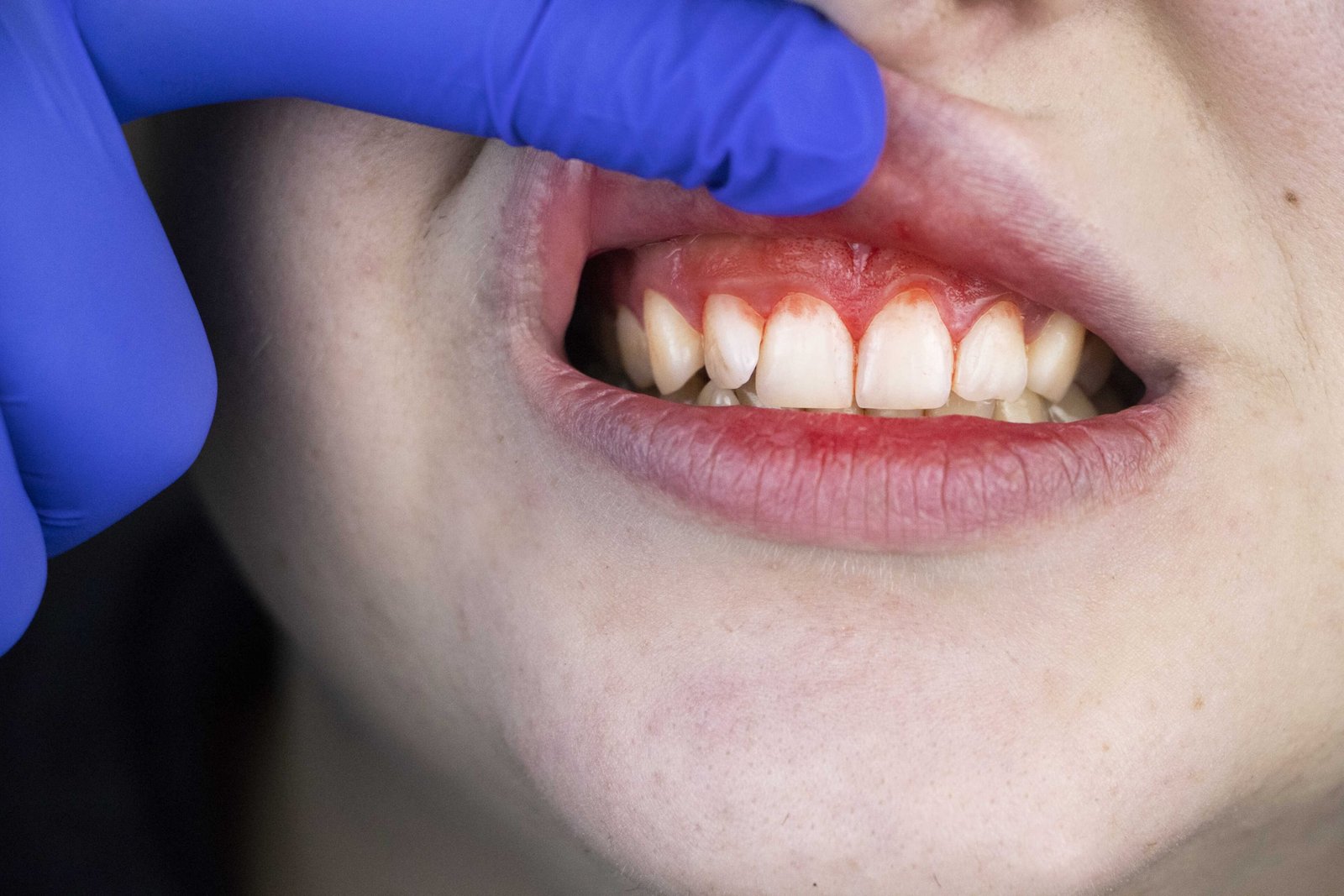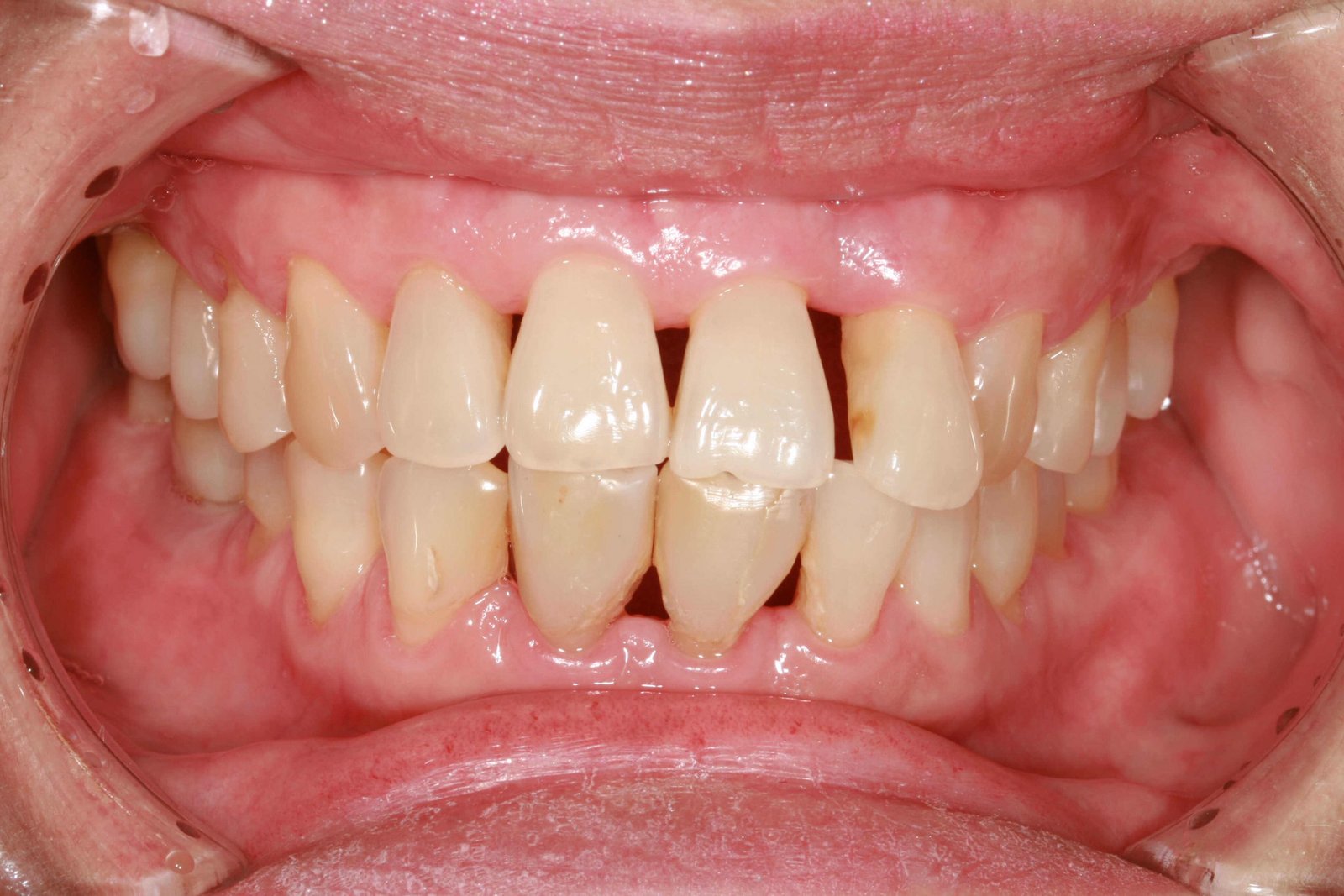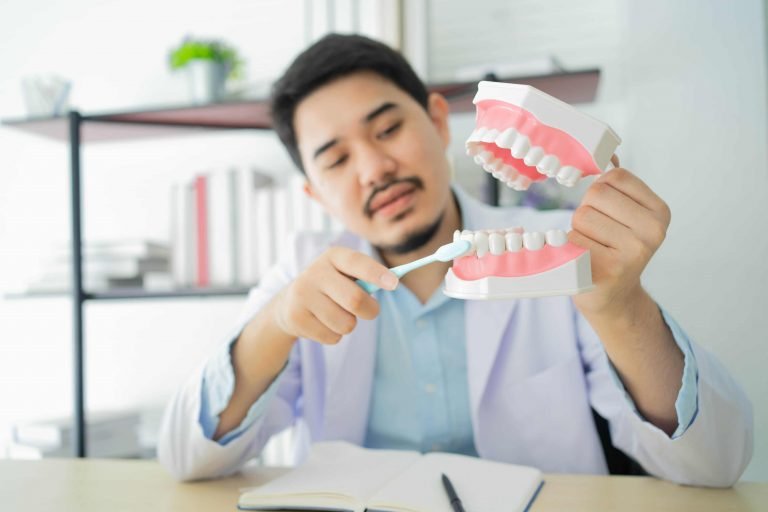Gum or mild gum recession is a common dental problem that can lead to more severe issues if not addressed promptly. Identifying the early signs of receding gums can help prevent further damage and maintain good oral health. This article will guide you through understanding gum recession, its causes, symptoms, and preventative measures. Incorporating daily practices and regular check-ups with your dentist can help prevent receding gums and ensure overall well-being.
Key Takeaways on How to Tell If Gums Are Receding
- Common Symptoms: Signs of receding gums include increased tooth sensitivity, visibly longer teeth, and exposed tooth roots.
- Lesser-Known Factors: Hormonal changes, certain medications, and orthodontic treatments can also contribute to gum recession.
- Prevention Tips: Practicing proper brushing techniques, maintaining a balanced diet rich in vitamins, and managing stress are essential to prevent gum recession.
- Professional Help: Regular dental check-ups are crucial for early detection and effective treatment of gum recession.
Understanding Gum Recession
Gum recession occurs when the gum tissue surrounding the teeth wears away or pulls back, exposing more of the tooth or its root. This condition can lead to gaps or pockets forming enough gum tissue between the teeth and gum line, making it easier for disease-causing bacteria to build up.
Causes of Gum Recession
- Periodontal Disease: This bacterial infection destroys gum tissue and the bone that supports your teeth.
- Genetics: Some people are more susceptible to gum disease regardless of how well they care for their teeth.
- Poor Oral Hygiene: Inadequate brushing and flossing make it easier for plaque to turn into calculus, leading to gum recession.
- Aggressive Tooth Brushing: Brushing your teeth too hard or the wrong way can cause enamel wear and push gums away from your teeth. It is important to use a soft-bristled brush and brush gently to prevent damage to the gums and teeth.
- Hormonal Changes: Fluctuations in female hormone levels during puberty, pregnancy, and menopause can make gums more sensitive and vulnerable to recession.
- Tobacco Use: Tobacco products can cause sticky plaque on teeth that is difficult to remove, leading to gum recession.
- Grinding and Clenching Teeth: Excessive force on the teeth can cause gums to recede.
- Misaligned Teeth or Bite: When teeth do not come together evenly, too much force can be placed on the gums and bone, leading to recession.
- Body Piercings: Lip or tongue piercings can rub against gum tissue, causing it to wear away.
Symptoms of Receding Gums
- Tooth Sensitivity: Exposed roots can lead to increased sensitivity to hot, cold, sweet, or acidic foods and drinks.
- Visible Tooth Roots: If you can see more of your teeth or the roots are becoming visible, your gums are receding.
- Longer Teeth Appearance: Teeth that appear longer than usual are a common sign of gum recession.
- Loose Teeth: As gums recede, the teeth may become loose due to a lack of support.
- Bad Breath: Persistent bad breath or a bad taste in the mouth can be a sign of gum disease.
- Gum Inflammation and Bleeding: Swollen, red, or bleeding gums during brushing or flossing can indicate gum problems, including recession.

Preventing Gum Recession
Maintain Good Oral Hygiene
- Brush Properly: Use a soft-bristled toothbrush and brush at a 45-degree angle to your gums, using gentle circular motions. Brush twice a day and replace your toothbrush every three months.
- Floss Daily: Flossing helps remove plaque and food particles from between teeth and along the gum line where a toothbrush can’t reach.
- Use Mouthwash: Antibacterial mouthwash can help reduce plaque and bacteria that brushing and flossing may miss.
Regular Dental Checkups to Prevent Periodontal Disease
Visit your dentist regularly for cleanings and checkups. Professional cleanings can remove tartar that cannot be eliminated by brushing and flossing. Your dentist can also identify early signs of gum disease and provide appropriate treatments.
Avoid Tobacco Products
Smoking and using tobacco products can significantly increase your risk of gum disease. Quitting tobacco can improve your oral health and overall health.
Use a Soft-Bristled Toothbrush
Hard-bristled toothbrushes can damage your gums. Use a soft-bristled toothbrush and gentle brushing techniques to protect your gums.
Healthy Diet
A balanced diet can help improve your oral health. Eating foods rich in vitamins and minerals, particularly vitamin C, can help maintain healthy gums.
Treatment for Receding Gums
Deep Cleaning (Scaling and Root Planing)
If your gum recession is due to plaque and tartar buildup, your dentist may recommend a deep cleaning. This procedure involves removing plaque and tartar from above and below the gum line and smoothing the exposed root area to help your gums reattach to the root surfaces of your teeth.
Gum Graft Surgery
For more severe cases of gum recession, a soft tissue graft may be necessary. This procedure involves taking tissue from the roof of the mouth or beneath the tongue as graft tissue, or using donor tissue, to cover exposed roots and restore the gum line.
Pinhole Surgical Technique
This minimally invasive gum surgery procedure involves making small holes in the gum tissue and using special instruments to gently reposition the gum over the exposed roots. This technique offers a quicker recovery time compared to traditional gum grafting.
Desensitizing Agents for Tooth Sensitivity
To manage tooth sensitivity caused by receding gums, your dentist may apply desensitizing agents to the affected gums pull your teeth. These agents can help reduce sensitivity and protect the exposed roots.

Home Remedies and Lifestyle Changes
Green Tea
Green tea has anti-inflammatory properties that can help reduce gum inflammation and promote oral health. Drinking green tea regularly can help improve gum and poor oral health.
Aloe Vera
Aloe vera is known for its healing properties. Applying aloe vera gel to the affected area can help soothe inflamed gums and promote healing.
Coconut Oil Pulling
Oil pulling involves swishing coconut oil in your mouth for 15-20 minutes. This practice can help reduce bacteria and plaque in affected gum tissue, improving gum health.
How to Tell If Gums Are Receding: Lesser-Known Factors
Gum or severe gum recession, is a dental issue where the gum tissue surrounding the teeth pulls back or wears away, exposing more of the tooth or its root. While some common signs and causes of gum recession are widely known, there are several lesser-known factors and symptoms that can also indicate the onset of this condition. Understanding these factors can help in early detection and prevention.
Understanding Lesser-Known Causes of Gum Recession
- Orthodontic Treatments
- Braces and Aligners: While orthodontic treatments are essential for correcting misaligned teeth, they can sometimes exert excessive pressure on the gums, leading to recession. The constant force applied by braces or aligners can cause the gums to recede over time, especially if not properly managed.
- Hormonal Changes
- Puberty and Pregnancy: Hormonal changes during puberty, menstruation, pregnancy, and menopause can make gums more sensitive and susceptible to recession. These fluctuations can affect the blood supply to the gums, making them more vulnerable to bacterial infections and inflammation.
- Medications
- Prescription Drugs: Certain medications, such as oral contraceptives, antidepressants, and medications for high blood pressure, can affect oral health. These drugs may cause dry mouth (xerostomia), which reduces saliva flow and increases the risk of gum recession. Saliva helps protect the gums by neutralizing acids and washing away food particles and bacteria.
- Nutritional Deficiencies
- Vitamin C Deficiency: A lack of essential nutrients, particularly vitamin C, can lead to gum problems. Vitamin C is crucial for maintaining healthy connective tissue and preventing gum inflammation. A deficiency in this vitamin can result in weakened gums and an increased risk of recession.
Symptoms of Receding Gums Beyond the Basics
- Unusual Tooth Mobility
- Loosening of Teeth: Teeth may begin to feel loose due to the loss of supportive gum tissue. This is more noticeable in advanced stages of gum recession, where the roots are exposed, and the structural support is compromised.
- Persistent Bad Taste in Mouth
- Metallic Taste: A persistent metallic taste in the mouth can indicate gum disease and recession. This taste often accompanies bad breath and is a sign of bacterial infection.
- Changes in Bite
- Altered Occlusion: Receding gums can lead to changes in how your teeth fit together when you bite. This alteration in bite can result from shifting teeth due to the loss of gum support.
- Increased Sensitivity
- Extreme Sensitivity to Temperatures: While tooth sensitivity is a common symptom, extreme sensitivity to hot and cold foods and beverages can be an early indicator of gum recession. This heightened sensitivity is due to the exposure of tooth roots that are not protected by enamel.
- Risk of Tooth Loss
- Severe Gum Recession: Severe gum recession can increase the risk of tooth loss. As the gums recede, the roots of the teeth become exposed, leading to a loss of structural support. In extreme cases, surgical interventions may be necessary to prevent further complications and tooth loss.

Preventive Measures and Home Remedies
- Proper Brushing Technique
- Gentle Brushing: Use a soft-bristled toothbrush and gentle, circular brushing motions to avoid damaging the gum tissue. Aggressive brushing can accelerate gum recession.
- Dietary Adjustments
- Anti-Inflammatory Foods: Incorporate foods that are anti-inflammatory and rich in antioxidants into your diet. Foods like green leafy vegetables, berries, nuts, and fatty fish can help reduce gum inflammation and promote overall oral health.
- Hydration
- Staying Hydrated: Drinking plenty of water throughout the day helps maintain saliva production, which is essential for neutralizing acids and protecting gums from bacteria.
- Stress Management
- Reducing Stress: Chronic stress can weaken the immune system and exacerbate gum disease. Practices such as yoga, meditation, and regular physical activity can help manage stress levels.
Advanced Treatment Options
- Laser Therapy
- Minimally Invasive Treatment: Laser therapy is a modern, minimally invasive treatment for gum recession. It involves using a laser to remove diseased gum tissue and bacteria, promoting the regeneration of healthy gum tissue.
- Platelet-Rich Plasma (PRP) Therapy
- Enhanced Healing: PRP therapy uses the patient’s own blood to create a concentrated mixture of platelets and growth factors. This mixture is applied to the affected gums to accelerate healing and tissue regeneration.
- Guided Tissue Regeneration (GTR)
- Stimulating Growth: GTR is a surgical procedure that uses biocompatible membranes to direct the growth of new bone and gum tissue. This technique helps restore the support structure around the teeth, preventing further gum recession.
Let’s wrap this up…
Gum recession is a common dental issue that can lead to more serious problems if left untreated. By understanding the causes, symptoms, and prevention methods preventing receding gums, you can take proactive steps to protect your gums and maintain good oral health. Regular dental checkups, good oral hygiene, and healthy lifestyle choices are essential for preventing and managing gum recession. If you suspect you have receding gums, consult your dentist for a proper diagnosis and appropriate treatment options. Taking action early can help preserve your smile and overall oral health.
For more tips on maintaining good oral health and other DIY guides, visit HowToKings.com.
*Editor’s Note: The information in this article is intended for your educational use only and is not a substitute for professional medical advice, diagnosis, or treatment. Always seek the advice of your physician or other qualified health providers with any questions you may have regarding a medical condition before undertaking any diet, supplement, fitness, or other health programs.




